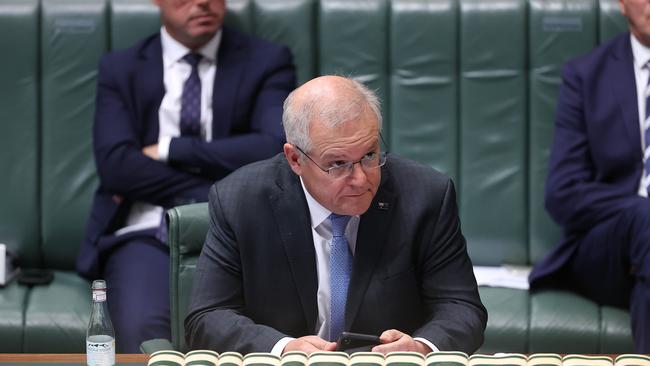We need an outbreak of government action
Coulda, shoulda, woulda – that’s the story of Australia’s plunge back into lockdowns and Scott Morrison’s stubbornness appears to be a factor.

Outbreaks that are happening because hotel quarantining is flawed, especially when it comes to protecting ourselves from virulent new strains.
Outbreaks that are made more dangerous because not enough Australians have been vaccinated – a failure of the slow rollout, exacerbated by vaccine hesitancy.
We coulda built quarantine facilities capable of containing the virus long before now, and we shoulda. We woulda accelerated the vaccine rollout and dovetailed doing so with a better public awareness campaign if we knew this is where we might end up.
But we didn’t and, stuck where we now are, there isn’t much we can do about it. Sure, it’s never too late to get going and construct purpose-built quarantine facilities around the country. In the current budget climate it’s not as though fiscal conservatism is an ideological impediment to the cost. But by the time they would be built it will be too late to avoid further hotel quarantine failures anyway.
We face many months of such failures even if the construction of purpose-built facilities started first thing Monday morning – which of course it will not.
It’s hard to escape the feeling that stubbornness on Scott Morrison’s part is a factor in the refusal to capitulate on these facilities.
The same coulda, shoulda, woulda lament goes for the vaccine rollout. It is accelerating. Each week beats the previous one for the number of Australians who are being vaccinated.
But the simple fact is that one jab is only partially effective. You need two to really feel relaxed and comfortable that you won’t die or get seriously ill if you catch Covid, as well as to minimise your chances of catching the virus and passing it on in the first place.
There is a 12-week wait between AstraZeneca jabs, which are freely available in great enough numbers to vaccinate everyone. But they are not recommended for those of us under 50, courtesy of rare blood clotting. Equally, courtesy of rare blood clotting, there are not enough people over 50 getting their AstraZeneca jabs.
It’s an understandable emotional fear, even if the maths and the health advice tell a different story. Again, the government probably should have handled differently how that information has been distributed – coulda, shoulda, woulda.
The Pfizer jab requires only a three-week wait between needles, but it isn’t freely available in the way AstraZeneca is. In short, we don’t have enough of it to go around yet, so the government necessarily has to limit who is eligible and drip-feed it out.
In hindsight we needed better deals across mRNA vaccines, but on that score we were unlucky and backed the wrong horse.
This week in question time the Prime Minister admonished Labor for not embracing bipartisanship when it came to the pandemic. We are all in this together, remember?
Morrison was critical of Anthony Albanese questioning the slow vaccine rollout and the failure to construct purpose-built quarantine facilities. But it was a weak response to the Opposition Leader’s valid questions.
There is no rule that bipartisanship must prevail. In fact it shouldn’t. I always found such demand callow during the height of the pandemic domestically.
The whole point of our Westminster system is that we have an opposition to hold the government of the day to account, to challenge its policy decision-making. That’s why parliament being shut down the way it was last year was so outrageous.
Partisanship for its own sake rightly gets called out. But Labor has legitimate gripes when it comes to failures that are exposing Australians to greater risk when Covid enters the community. None of which should detract from the fact Australia is still where you want to be. We have managed the pandemic well – and as well, if not better, than anywhere else in the world.
Labor hopes to replace that proven success with emerging failures as the narrative. It will be a fascinating political contest to watch. A government seeking re-election post pandemic claiming credit for successes early on that built the foundations for the jobs and economic recovery it now wants to focus on.
Sure, the Coalition has thrown fiscal discipline completely out the window. Hypocrisy aside, it hopes not to be penalised for that, and it likely won’t be. But it will be penalised if we see rolling outbreaks and lockdowns in the months counting down to election day, especially if they hamper economic recovery and cost jobs.
In addition to its macro arguments for re-election, the Coalition is zeroing in on what are micro weaknesses for Labor. Opposing the gas-fired power plant in NSW’s Hunter Valley was right on policy grounds but wrong on the politics. I realise good policy theoretically is supposed to equate with good politics, but that’s not always true.
By opposing the $600 million spend in the Hunter, Labor has exposed itself in three seats in and around that region. It also gives the government ammunition to attack Labor in the twin resource states of Western Australia and Queensland. Joel Fitzgibbon knows this, which is why he has been so outspoken.
While most of his colleagues do not agree with his decision to cause havoc by going public, many privately agree with his sentiments — more than Labor’s leadership team seem to realise.
They appear to be focused on picking away at problems in Parliament House. Yes, there is an abundance of issues with the toxic culture that has been exposed, but the wider public is infinitely more concerned with issues that affect their daily lives. Some within Labor haven’t come to grips with this post-budget reality, hoping instead to spark further problems for Morrison on the gender front.
If Team Morrison is going to be brought down it won’t be courtesy of what goes on inside the beltway. It will be because quarantine and vaccine failures that affect ordinary Australians shift votes accordingly.
The sooner those with decision-making authority in the opposition realise this is the only game in town, the better the chances they can politically exploit the situation to electoral advantage.
If that doesn’t happen, Morrison will win a fourth term, and push himself into the upper echelons of Liberal prime ministers, and Labor will be left to look back thinking about what it coulda, shoulda and woulda done differently if it had its time again.
Peter van Onselen is a professor of politics and public policy at the University of Western Australia and Griffith University.






“Coulda”, “shoulda”, “woulda” – that’s the story of Australia’s plunge back into lockdowns as we brace for potential future Covid-19 outbreaks.